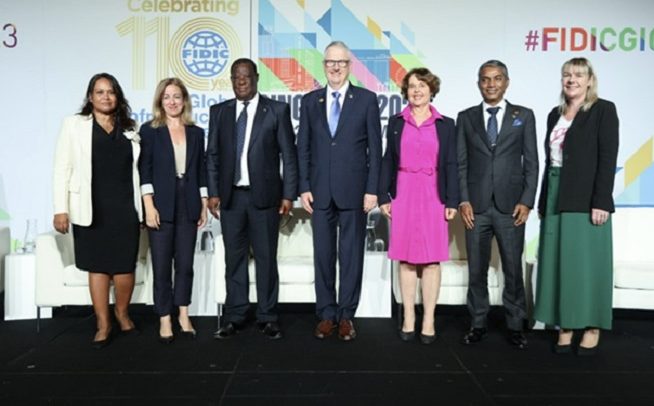Amoako-Attah and his hosts
Minister of Roads and Highways, Kwasi Amoako-Atta has said Ghana’s road transport sector has seen tremendous growth across the 16 regions of the country over the past six years.
He indicated that the government’s investment in road infrastructure has led to the construction of 11,975 km of roads, 33 bridges, and 6 interchanges among other things.
Speaking at the 2023 FIDIC Global Infrastructure Conference in Singapore, the Minister underlined that roads continue to be Ghana’s primary mode of transportation, accounting for more than 90% of all national traffic.
According to Mr. Amoako-Attah, the country’s road network currently spans 94,203 kilometers.
He stated that the most pressing need that Ghanaians wanted the government to address was road infrastructure development.
“Year in and year out, roads continue to make the top five priorities of the Ghanaian people. According to a 2019 report published by the Centre for Democratic Development (CDD-Ghana), for the first time since 2002, road infrastructure topped the list of citizens’ priority needs, beating unemployment, which had dominated the list in all those years.”
“According to the report, six in ten Ghanaians, or 60 per cent said roads were the topmost of the three priority areas they wanted the government to immediately address,” he quoted.
He added, “However, considering the challenges in mobilising resources, for the government’s development agenda, the industry players must work together to fashion out ways to ensure investment for the benefit of our people.”
He believes that the engineering industry can play a critical role in assisting politicians in making sound judgments on infrastructure development in their various countries.
According to him, the relationship between the consulting engineering industry and politicians is symbiotic, with politics and infrastructure provision expected to suit people’s demands.
“Politicians’ decisions may appear irrational, whereas the consulting engineer will want to be rational. In the spirit of collaboration, the first step in influencing politicians is to lay a solid foundation of knowledge in order to identify a shared ground for decision-making,” he stated.
Mr. Amoako-Attah was in Singapore at the invitation of the International Federation of Consulting Engineers (FIDIC), which was commemorating the organization’s 110th anniversary.
The Conference’s topic was “Infrastructure – There’s No Time To Lose: Sustainable Global (and Local) Strategies To Build A Better World,” and it aimed to emphasize the importance of investing in infrastructure responsibly at the local and national levels in order to enhance the global environment.
By Ernest Kofi Adu


